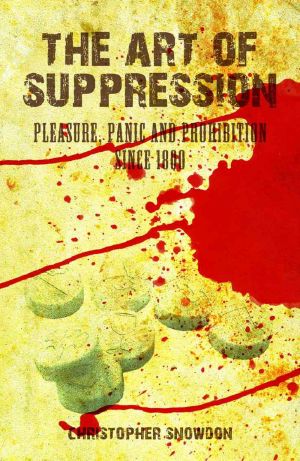The Art of Suppression · Pleasure, Panic and Prohibition Since 1800

- Authors
- Snowdon, Christopher
- Publisher
- Little Dice
- Tags
- 20th century , 19th century , modern , political science , history
- ISBN
- 9780956226532
- Date
- 2011-10-03T00:00:00+00:00
- Size
- 0.39 MB
- Lang
- en
The prohibition of alcohol in the USA was a notorious fiasco.
The War on Drugs has been a deadly failure.
Bans on alternative nicotine products keep people smoking cigarettes.
Attempts to suppress legal highs result in more drugs hitting the market.
Prohibition doesn't work but the world is filled with prohibitionists. Why?
Christopher Snowdon's new history of prohibitions is a panoramic study of how bans begin, who instigates them and why they fail. It is a story of moral panics, vested interests and popular hysteria, driven by people who believe that utopia is only ever one ban away.
Includes: The campaign for alcohol prohibition in the USA
The worldwide ban on opium and the dawn of the War on Drugs
The curious case of the European Union's ban on oral tobacco (snus)
The 1920s crusade to suppress drinking worldwide
The prohibition of Ecstasy and the rise of designer drugs
The enduring appeal of prohibitionist policies today
"The new Ken Burns and Lynn Novick documentary Prohibition is a five-and-a-half-hour missed opportunity to demonstrate why bans on substances are doomed from the start. Fortunately, for those who want to understand the irresistible lure of all types of prohibitions, there is Christopher Snowdon's The Art of Suppression: Pleasure, Panic and Prohibition Since 1800. Although Snowdon's comprehensive history will never reach as many people as the PBS series, The Art of Suppression makes the case that Burns seems to go out of his way to avoid: that prohibition of products that people desire, whether alcohol a century ago or Ecstasy today, is bound to fail miserably.
It is easy now, as Ken Burns has masterfully done, to ridicule the prohibition of alcohol. But Snowdon does the heavy lifting of catching modern-day Carrie Nations in the act. Despite a long history of failure, the public always seems ready to enlist in prohibitionist campaigns, perhaps believing, as Snowdon puts it, that "utopia is only ever one ban away." - Jeff Stier, Reason magazine
"In masterfully charting the history of the prohibitionists' war on pleasurable substances, in highlighting their endless failures to impose restrictions on the public, in exposing their dodgy use of statistics and 'evidence bases' to disguise moral arguments, and in emphasising the ability of us as individuals to exercise our capacity for self-restraint and personal responsibility, Snowdon does all of us determined to challenge the contemporary prohibitionist movement a great service." - Patrick Hayes, Spiked
"When the law cuts off one avenue of pleasure, new sources are invariably found," as Snowdon puts it. If there is any great demand for a certain product, be it food, drink, drugs or sex, then the risks of purveying it are met by colossal rewards. The Art of Suppression is full of great facts - its description of opium-addicted Britain before the wars is particularly memorable. But its real impact is its pithy denunciation of the prohibitionist cause. It ends with a modest proposal for a more practical and tolerant approach to drugs of all kinds. In his modesty Snowdon does not hold much hope for implementation. But this book must make that goal more likely." - Tom Miers, author of Democracy and the Fall of the West